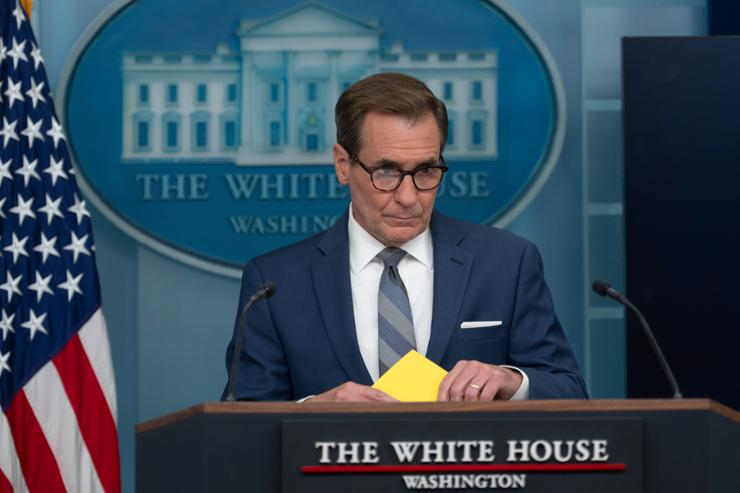
From left, Roscosmos Head of State Yuri Borisov, Russian President Vladimir Putin, North Korean Chairman of the State Affairs Commission Kim Jong Un and Director of the Center for Operation of Space Infrastructure on Earth (TsENKI) Nikolai Nestek visit the Vostochny Cosmodrome. TASS-Yonhap News Agency
A State Department spokesman said on Monday that deepening military cooperation between North Korea and Russia was a trend of “great concern,” following North Korea’s announcement that Russian President Vladimir Putin would visit Pyongyang this week.
North Korea’s state-run Korean Central News Agency said Putin planned to make an official visit to Pyongyang from Tuesday to Wednesday amid growing concerns that he and North Korean leader Kim Jong Un would seek to strengthen bilateral military ties that could affect security on the Korean peninsula and beyond.
“We are aware of reports that President Putin will visit Pyongyang soon,” the spokesman said in response to questions from Yonhap News Agency.
“The deepening military cooperation between Russia and North Korea is a trend that should be of great concern to all those interested in maintaining peace and stability on the Korean Peninsula, upholding the global nuclear non-proliferation regime, and supporting the Ukrainian people in defending their freedom and independence from brutal Russian aggression,” the official added.
DPRK is the abbreviation for Democratic People’s Republic of Korea, the official name of North Korea.
Department spokesman Matthew Miller reiterated that position at a press conference.
“Over the past few months, we’ve seen North Korea illegally transfer dozens of ballistic missiles and more than 11,000 containers of munitions to support Russia’s war effort,” he said. “We’ve seen that munitions appear on the battlefields of Ukraine. We know they are using North Korean munitions to threaten Ukraine and kill Ukrainians, so we will continue to make our concerns clear.”

White House National Security Communications Adviser John Kirby attends a press conference at the White House in Washington, DC on June 17. UPI-Yonhap News
He also reiterated his call on Russia to respect all UN Security Council resolutions on nuclear non-proliferation.
At a separate press conference, White House National Security Communications Adviser John Kirby expressed concern about the security implications of military dealings between Moscow and Pyongyang on the Korean peninsula.
“We are not worried about (Putin’s) visit. What we are worried about is the impact on the Ukrainian people, as North Korean ballistic missiles are still being used to strike targets in Ukraine, but also the deepening ties between our two countries,” he said.
“But there may be interactions here that could have implications for security on the Korean Peninsula. We don’t see the full extent of that at this point. We certainly haven’t seen it play out, but we’ll certainly be watching it very closely,” he added.
Seoul, Washington and other countries have been closely watching the development of bilateral military ties between Pyongyang and Moscow because of broader security implications.
In addition to the missile shipments, Washington said North Korea had sent more than 10,000 containers of military or military-related materials to Russia since September.
In return, North Korea is seeking assistance from Moscow including fighter jets, surface-to-air missiles, armored vehicles and ballistic missile production facilities, U.S. officials said.
This will be Putin’s first visit to North Korea in 24 years. The last time he visited was in July 2000, when Kim Jong-un’s father, the late Kim Jong-il, was in power. (Yonhap News Agency)

